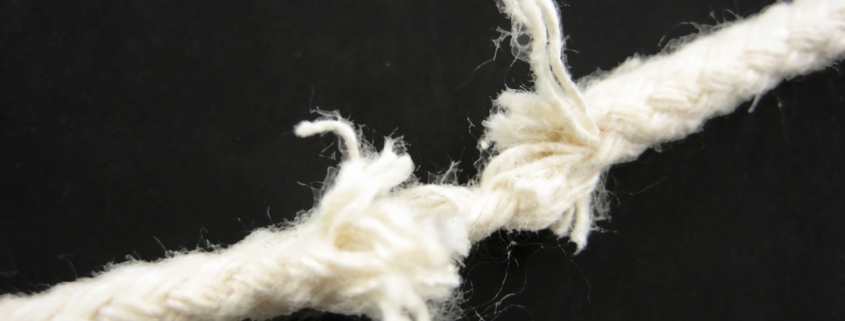Threads by Mary Lou Sanelli
Threads
Mary Lou Sanelli
It’s a familiar story: I met someone who became my friend. And though this someone was a man, we were never more than a friendship. From his first dance class in my studio, there was something between us that might have made people think we were more, but it was never like that.
I remember the first time we talked, really talked. We leaned against the barre with our arms folded, our thoughts freed, and from then on, our conversations ranged from crucial issues (personal history, politics, choices we made that were good, but just as often bad) to the everyday (films, books, the absurdities of small town life). “That woman,” I said to him once, upset about a comment made by the graphic designer working on the cover for my newest book, “had the nerve to say that I dressed too stylishly for a small town. What kind of an artist would say that?”
There was a long pause.
“Someone ought to tell that woman not to walk around in yoga pants. Her backside looks like a mattress folded in half,” he said, and I loved him for saying the words, for being a man who could deliver a line like that without apology. He always knew how to make me laugh. And because he wasn’t a man for groupthink correctness, I found it freeing to laugh with someone whose sense of humor seemed to mirror my own. It grounded me.
We laughed about so many things.
And when he got cancer, once or twice we even tried to laugh about that.
But it fell flat.
I kept working on a piece of choreography at a frantic pace, as if I could beat what was coming, which right there is the worst of self-deception. If I could express my fear, I told myself, I could handle it. But whatever I thought I knew about coping at the time, I had no ability to admit that the choreography may have been a desperate counter to loss and grief. It wasn’t working.
Meanwhile, he got weaker.
If there is one sink hole you never want to go down, it’s this one: I started to read everything on-line about cancer. But what those websites never tell you is that the only way to deal with loss is to, first, surrender to its intensity (which is like the seven major plates of earth shifting in your chest) and secondly, take all the time you have left to love others as much as you can. There are so many people in need of so much love.
The year after he was gone, when I struggled the most with grief, it felt as if a lot about life held none of the protections I relied on. It was as if I’d reach for a familiar safety net and fall through the mesh.
I still feel a loneliness so deep when I look at a framed photo of him dressed as Othello that sits on a shelf in my living room.
But we are capable of moving on (an absurd phrase when you think about it, as if we are standing stock-still when bearing the unbearable), and so we do. We give in.
Or, no, not in. That sounds too much like defeat.
We give ourselves back. To ourselves . . . eventually.
Words I couldn’t have conveyed when my friend was dying but just now they literally wrote themselves.
And today, when I drive from my home on Bainbridge Island to teach dance in Port Townsend, I give myself extra time to stop in Chimacum because that’s where he lived. I thought I’d have to avoid this route, but that’s not at all how it feels. I like to shop at the farm store that sits by the four-corner stop, but mostly I want to get out of the car, stand, stretch, and breathe in the air that surrounds a place he loved.
Maybe we use metaphors because they are such an old, old, writing tool. Or maybe we use them because they help us reveal a familiar version of what we are trying to say. I like most the ones that address something painful while also lessening the pain, and when I walk by the yarn store on the ground floor of my building near the ferry terminal with its window full of colorful skeins, I can’t help but compare weaving to, well, us. That two threads need to bind in order to knit is just so metaphorically perfect.
And now, out of all the perfect metaphors, this one stands out for me: I was bound to him. And in many ways, I’m still at loose ends without him.
But in other ways, I’m stronger. The strength I’ve gained may feel at times more like a knot than a knit, but it holds. And though I’d like to say this hold comes from having known him, that’s not the whole story. It comes from having the courage to let him know me.
Love is always about risk. This is the line I say to myself every time I reread this piece from the beginning to this point.
I think it is trying to tell me to end right here.
Mary Lou Sanelli’s newest collection of essays, In So Many Words, has been nominated for a 2025 Washington State Book Award & a 2025 Pacific Northwest Book Award. A professional speaker and master dance teacher, she lives with her husband on Bainbridge Island, Washington. For more info, please visit www.marylousanelli.com.


